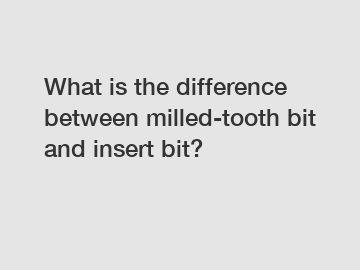What is the difference between milled-tooth bit and insert bit?
What is the difference between milled-tooth bit and insert bit?
When it comes to drilling into hard rock formations during oil and gas exploration or mining activities, two types of drill bits are commonly used: the milled-tooth bit and the insert bit. Both have their own unique features, advantages, and limitations. So, what exactly sets these two types apart? Let's delve deeper into the characteristics and differences between milled-tooth and insert bits.
Milled-tooth Bits:

1. Construction: Milled-tooth bits are made using high-quality steel. They consist of numerous individual teeth that are milled into the bit's cone-shaped body. These teeth are carefully designed to effectively cut through rock formations.
2. Tooth Design: The milled-tooth bit has three different designs: milled tooth, tungsten carbide insert, or a combination of both. The milled tooth design employs steel teeth that penetrate and grind the rock surface. The tungsten carbide insert design, on the other hand, incorporates cones with durable inserts, which are more resistant to wear and tear.
3. Durability: Milled-tooth bits are more prone to wear and require frequent sharpening or replacement. As they grind through hard formations, the teeth can erode over time. However, the tungsten carbide insert design offers improved durability and can handle extremely harsh drilling environments for longer durations.
4. Versatility: Milled-tooth bits are more versatile and can be used in a wide range of formations, including softer rocks and abrasive shale. This type of bit adjusts efficiently to changes in formation hardness, making it suitable for diverse drilling applications.
Insert Bits:
1. Construction: Insert bits are made using a combination of tough steel and super-hard tungsten carbide inserts. These inserts are often arranged in a specific pattern to optimize the bit's cutting performance.
2. Insert Types: Various types of inserts are used in insert bits, such as polycrystalline diamond compact (PDC), natural diamond, or cubic boron nitride (CBN). These inserts are highly resistant to wear and erosion, allowing them to maintain their cutting efficiency for longer periods.
3. Stability: Insert bits offer greater stability and improved control during drilling operations. The inserts are strategically positioned and reinforced with strong bonding agents, ensuring enhanced grip and stability while penetrating hard rock formations.
4. Speed and Efficiency: Due to their design and cutting mechanism, insert bits generally offer greater drilling speed and efficiency compared to milled-tooth bits. The PDC inserts, in particular, have revolutionized the drilling industry with their exceptional cutting capabilities and resistance to abrasion.
In conclusion, both milled-tooth and insert bits have their own unique characteristics that make them suitable for specific drilling applications. The milled-tooth bits are known for their versatility and adaptability to various formations, while the insert bits excel in stability, speed, and durability. The choice between these two types depends on the specific drilling requirements, such as the formation type, hardness, and anticipated drilling conditions.
Whether you opt for a milled-tooth bit or an insert bit, it is essential to consider factors such as bit cost, expected lifespan, drilling speed, and the overall objective of the drilling operation. By selecting the most appropriate type of bit for the job, operators can optimize drilling performance, minimize downtime, and increase overall productivity.
If you are looking for more details, kindly visit Rotary Drilling Core Barrel, Tricone Bits For Sale, Matrix PDC Bit.
90
0
0

Comments
All Comments (0)